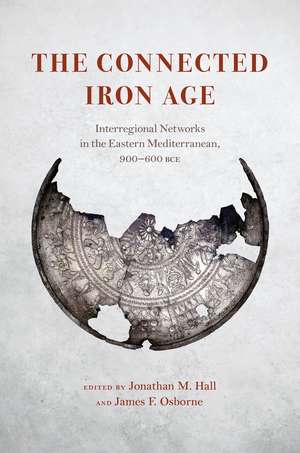The Connected Iron Age: Interregional Networks in the Eastern Mediterranean, 900-600 BCE
Editat de Jonathan M. Hall, James F. Osborneen Limba Engleză Hardback – 9 dec 2022
The early first millennium BCE marks one of the most culturally diverse periods in the history of the eastern Mediterranean. Surveying the region from Greece to Iraq, one finds a host of cultures and political formations, all distinct, yet all visibly connected in meaningful ways. These include the early polities of Geometric period Greece, the Phrygian kingdom of central Anatolia, the Syro-Anatolian city-states, the seafaring Phoenicians and the biblical Israelites of the southern Levant, Egypt’s Twenty-first through Twenty-fifth Dynasties, the Urartian kingdom of the eastern Anatolian highlands, and the expansionary Neo-Assyrian Empire of northern Mesopotamia. This volume adopts an interdisciplinary approach to understanding the social and political significance of how interregional networks operated within and between Mediterranean cultures during that era.
Preț: 302.77 lei
Nou
Puncte Express: 454
Preț estimativ în valută:
57.94€ • 60.77$ • 48.23£
57.94€ • 60.77$ • 48.23£
Carte disponibilă
Livrare economică 11-25 martie
Livrare express 25 februarie-01 martie pentru 40.13 lei
Preluare comenzi: 021 569.72.76
Specificații
ISBN-13: 9780226819044
ISBN-10: 0226819043
Pagini: 272
Ilustrații: 40 halftones
Dimensiuni: 152 x 229 x 30 mm
Greutate: 0.57 kg
Ediția:First Edition
Editura: University of Chicago Press
Colecția University of Chicago Press
ISBN-10: 0226819043
Pagini: 272
Ilustrații: 40 halftones
Dimensiuni: 152 x 229 x 30 mm
Greutate: 0.57 kg
Ediția:First Edition
Editura: University of Chicago Press
Colecția University of Chicago Press
Notă biografică
Jonathan M. Hall is the Phyllis Fay Horton Distinguished Service Professor in the Humanities and professor in the Departments of History and Classics and in the College at the University of Chicago. He is the author of Ethnic Identity in Greek Antiquity; Hellenicity: Between Ethnicity and Culture, which was awarded the Gordon J. Laing Award; A History of the Archaic Greek World; Artifact and Artifice: Classical Archaeology and the Ancient Historian; and Reclaiming the Past: Argos and its Archaeological Heritage in the Modern Era. James F. Osborne is associate professor of Anatolian archaeology at the University of Chicago's Oriental Institute and Department of Near Eastern Languages and Civilizations. He is the author of The Syro-Anatolian City-States: An Iron Age Culture, editor of Approaching Monumentality in Archaeology, and coeditor of Territoriality in Archaeology.
Cuprins
List of Figures
Preface
Chapter 1
Interregional Interaction in the Eastern Mediterranean during the Iron Age
James F. Osborne and Jonathan M. Hall
Chapter 2
Phoenicians and the Iron Age Mediterranean: A Response to Phoenicoskepticism
Carolina López-Ruiz
Chapter 3
Mediterranean Interconnections beyond the City: Rural Consumption and Trade in Archaic Cyprus
Catherine Kearns
Chapter 4
Connectivity, Style, and Decorated Metal Bowls in the Iron Age Mediterranean
Marian H. Feldman
Chapter 5
Close Encounters of the Lasting Kind: Greeks, Phoenicians, and Others in the Iron Age Mediterranean
Sarah P. Morris
Chapter 6
The Mediterranean and the Black Sea in the Early First Millennium BCE: Greeks, Phoenicians, Phrygians, and Lydians
Susan Sherratt
Chapter 7
Greeks, Phoenicians, Phrygians, Trojans, and Other Creatures in the Aegean: Connections, Interactions, Misconceptions
John K. Papadopoulos
Chapter 8
Anatolia, the Aegean, and the Neo-Assyrian Empire: Material Connections
Ann C. Gunter
Chapter 9
Egypt and the Mediterranean in the Early Iron Age
Brian Muhs
Chapter 10
Globalizing the Mediterranean’s Iron Age
Tamar Hodos
Chapter 11
Six Provocations in Search of a Pretext
Michael Dietler
Contributors
Index
Preface
Chapter 1
Interregional Interaction in the Eastern Mediterranean during the Iron Age
James F. Osborne and Jonathan M. Hall
Chapter 2
Phoenicians and the Iron Age Mediterranean: A Response to Phoenicoskepticism
Carolina López-Ruiz
Chapter 3
Mediterranean Interconnections beyond the City: Rural Consumption and Trade in Archaic Cyprus
Catherine Kearns
Chapter 4
Connectivity, Style, and Decorated Metal Bowls in the Iron Age Mediterranean
Marian H. Feldman
Chapter 5
Close Encounters of the Lasting Kind: Greeks, Phoenicians, and Others in the Iron Age Mediterranean
Sarah P. Morris
Chapter 6
The Mediterranean and the Black Sea in the Early First Millennium BCE: Greeks, Phoenicians, Phrygians, and Lydians
Susan Sherratt
Chapter 7
Greeks, Phoenicians, Phrygians, Trojans, and Other Creatures in the Aegean: Connections, Interactions, Misconceptions
John K. Papadopoulos
Chapter 8
Anatolia, the Aegean, and the Neo-Assyrian Empire: Material Connections
Ann C. Gunter
Chapter 9
Egypt and the Mediterranean in the Early Iron Age
Brian Muhs
Chapter 10
Globalizing the Mediterranean’s Iron Age
Tamar Hodos
Chapter 11
Six Provocations in Search of a Pretext
Michael Dietler
Contributors
Index
Recenzii
"This well-produced volume succeeds in its stated goal of emphasizing the complexity of cultural exchange in the Early Iron Age Eastern Mediterranean. It also admirably fulfills the aim of drawing attention to often-overlooked regions: as a reader who works largely in the Aegean and was trained in a Classics department, I found the discussions of Egypt, the Black Sea, and Phrygia particularly valuable."
"This is an interesting volume with engaging discussions on various modes of connectivity. The chapters are well written, supported by some good illustrative material, and effectively address the four themes set out in the introductory chapter, leaving the best to last."
“This volume is essential reading for anyone studying ancient Mediterranean societies and their development. It is an important and timely manifestation of new thinking and innovative approaches to the complex world of the early first millennium BCE and its cross-cultural connections.”
“The Connected Iron Age is a solid and worthwhile collection that brings an original focus on the East Mediterranean to the burgeoning literature on connectivity.”
“This volume is an up-to-date synthesis of interregional networks during the early first millennium in the Mediterranean from Iberia in the west to the Levantine coast and the Black Sea in the east. It explores a range of recent theoretical approaches regarding economic, social, and cultural connectivity and offers new and vigorous directions to the study of Mediterranean interactions and cultural contacts of the period.”
